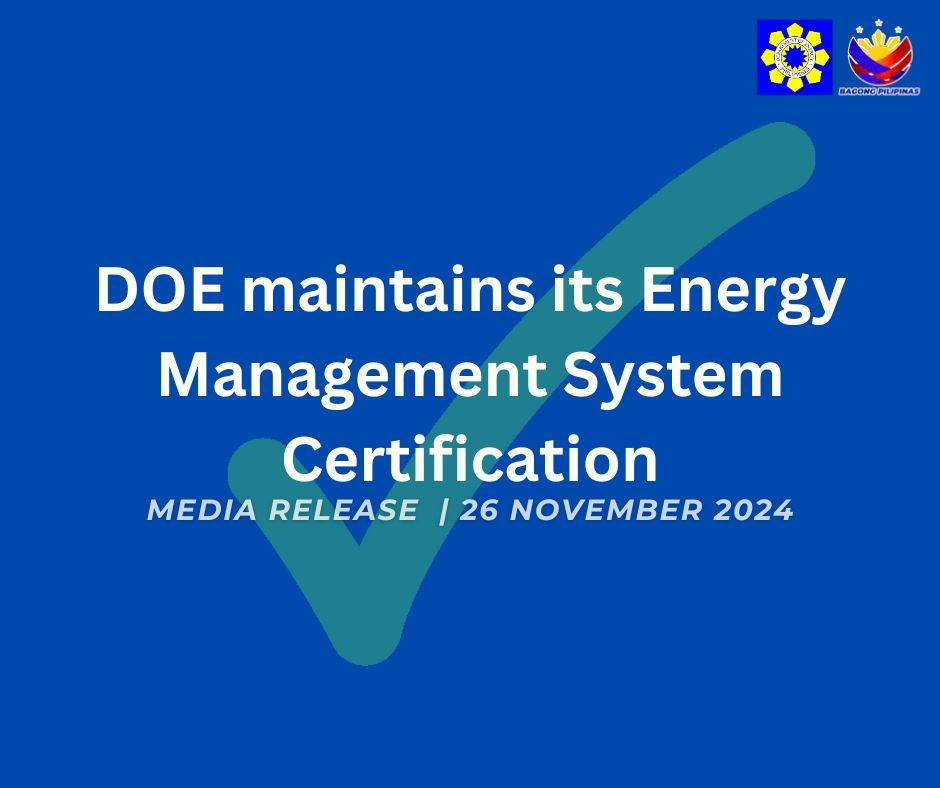
The Department of Energy (DOE) maintains its department-wide ISO 50001:2018 certification, the international standard for Energy Management Systems (EnMS). It remains the only government agency in the country to achieve this distinction at a department-wide level, highlighting its leadership in energy efficiency and sustainability.
ISO 50001:2018 is an international energy management system standard that provides organizations of any size with a tool to optimize energy performance and promote more efficient energy management systematically. The audit for the DOE’s certification was conducted by DQS Certification Philippines, Inc. from 21 to 22 November 2024.
This certification reflects the DOE’s steadfast commitment to enhancing energy performance, improving operational efficiency, and institutionalizing sustainable energy management practices across its organization.
In December 2023, the DOE achieved this milestone, becoming the first and only department-wide government agency in the country to receive an ISO certification for EnMS following a comprehensive audit conducted in the same month.
Aligned with ISO 50001 international guidelines, the DOE has continued to implement systematic processes to reduce energy consumption. In September 2024, the Department further strengthened its Energy Management Team to bolster the implementation of energy efficiency and conservation (EEC) measures, ensuring long-term integration into its operations.
One of the key initiatives is the adoption of a flexible work arrangement, or the Friday work-from-home scheme. Since its implementation in February 2023, this initiative has led to an average monthly electricity savings of over 14%, equivalent to 18,303 kWh or ₱214,649.04. Over the 22 months of its implementation or from February 2023 to November 2024, the Department has achieved an estimated total savings of ₱4.72 million, demonstrating the effectiveness of this energy efficiency measure.
Complementing the flexible work arrangement is the department-wide adoption of a default air-conditioning temperature of 24 degrees Celsius during the four-day in-person work week, further demonstrating its commitment to energy efficiency.
Regular energy audits and spot checks have also played a crucial role in achieving the DOE’s energy efficiency goals. These initiatives have heightened employee awareness, fostered a culture of energy conservation, and encouraged the consistent adoption of EEC measures in daily routines.
In addition to its internal initiatives, the DOE has significantly advanced its performance in the Government Energy Management Program (GEMP), achieving a cumulative electricity savings of 30.04% as of October 2024. This translates to a reduction of 21.84 MWh compared to the 2019 baseline of 72.73 MWh. This baseline figure represents the average monthly electricity consumption of the DOE prior to the passage and implementation of Republic Act (RA) No. 11285 or the Energy Efficiency Act of 2019.
The GEMP is guided by the Inter-Agency Energy Efficiency and Conservation Committee (IAEECC), established under RA 11285. The program aims to reduce electricity and fuel consumption across government agencies by at least 10% through EEC strategies.
Key initiatives under the GEMP include retrofitting of air-conditioning and lighting systems with energy-efficient inverter and LED technologies, deploying electric vehicles, and conducting regular monitoring and documentation of energy consumption. These efforts highlight the DOE’s commitment to fostering sustainable energy practices and setting a standard for efficiency across all government agencies.
Energy Secretary Raphael P.M. Lotilla expressed his appreciation for the DOE’s collective efforts. “I am pleased with the proactive engagement of our employees, whose contributions have been instrumental in the success of the Department’s energy-saving initiatives. Their dedication sets a strong example of how collective action can drive meaningful change in managing resources responsibly. The confirmation of this certification ahead of the Annual National Energy Consciousness Month in December serves as a fitting prelude to the celebration,” the Secretary said.
The DOE’s ISO 50001:2018 certification underscores its leadership in promoting energy efficiency and sustainability, serving as a model for both public and private organizations. ###
